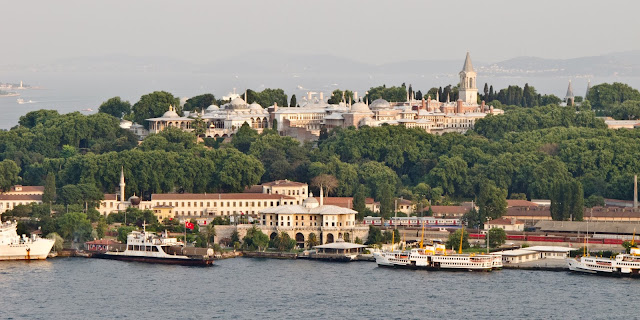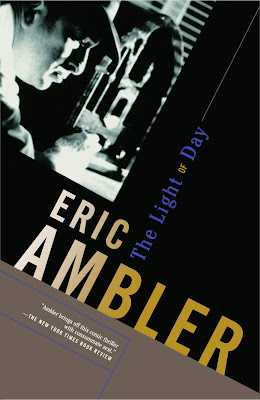I
downloaded Eric Ambler's The
Light of Day because in
perusing the list of Amblers on Kindle I saw that the 1962 film
Topkapi
was based on Light of Day.
Not sure I've ever seen Topkapi,
but I remember when it came out, about a year before I joined the
Army. If I saw it back then I might have been too drunk to remember
much more than that it involved a group of professional jewel thieves
stealing priceless jewells from a museum in Turkey. But that vague
recollection—if you could even call it that—was enuf to persuade
me to make Light of Day
my first Ambler. It won't be the last, either.
Not sure
why I'd never read Ambler before. I was familiar with the name, and
some of the titles, and might have seen a movie or two based on his
novels. What steered me to the Kindle
Bookstore last week was reading Elgin Bleeker's review of The
Mask of Dimitrios (also known as A
Coffin for Dimitrios), which rang some
familiar bells—again because of a movie, this one starring two of
my favorite noir actors, Peter Lorre and Sydney Greenstreet. Elgin's
review of the novel can be found on his blog The
Dark Time.
I'll concede up front I didn't
think I was going to like Light of Day, because I didn't think
I was going to like the narrator--Arthur
Abdel Simpson, born of an Egyptian mother and British officer father.
A petty hustler of tourists, he struck me as one of the reasons I've
always felt uncomfortably wary traveling. The sort of character Peter
Lorre would play in
his smarmy, sneaky, larcenous way
(Peter Ustinov played Simpson in the film, which should have rendered
the character a tad more likeable).
It
was Simpson’s honesty about himself and his situational ethics, and
his quick and disarming gift of gab, that quickly hooked me solidly.
I had to know how he’d get out of the damned mess he got himself
into with the tourist he sold his guide/chauffeur’s services to,
who catches him in his room trying to steal some travelers checks.
The tourist, whom we know as “Harper,” turns out to be a bigger
hustler than Simpson, blackmailing him into driving a Lincoln
Continental from Greece to Turkey for a woman who would meet him
there. Harper would join them later in Istanbul. As we can most
certainly surmise, from the oddness of this arrangement and from
Simpson’s comment on his own misgivings, shortcomings, and tactical
blunders, the plot has nowhere to go but to thicken.
And,
of course, it does, it thickens to the consistency of wet cement when
Turkish customs officials find guns and grenades hidden in the
Lincoln’s doors. Simpson faces a long prison term, or worse, unless
he agrees to play along with Turkish counter-espionage officials who
want him to find out what the weapons are intended for. They suspect
a plot against the Turkish government. Simpson suspects a heroin
smuggling operation. Either way, he has no choice but to play along.
Turkish security agents follow the Lincoln all of the way to Istanbul
and keep a constant surveillance of Simpson and his eventual several
nefarious colleagues, while Simpson must report regularly to the
security people everything he can learn about whatever plot this
strange group has in mind.
Of
course there are many close calls for Simpson, whom, by now, I’m
identifying with so closely I actually cringed and blew out some of
my own breath to see if I could tell if it stinks after the poor
schmuck (schlemiel? dork?)
overhears some of the plotters talking about him. “Even
Arthur could do the rest of that job,” says
the attractive woman in the group, and
laughs.
“The indignant sheep? With his breath you wouldn’t even need the
grenades, I guess. You’d get a mass surrender.”
The
sting stays, and he mentions it in a little soliloquy at the end,
which eased my own insecurities a tad as well, as my identification
with him—as I most often do with fictional narrators and
protagonists—began disengaging:
“I am not asking to be
loved. I am not asking to be liked. I do not mind being loathed, if
that will make some pettifogging government official happier. It is a
matter of principle. If necessary, I shall take my case to the United
Nations. They caned the British after Suez; they
can cane them again for me. Sheep I may be;
and perhaps certain persons find my breath displeasing;
but I am no longer merely indignant. I am angry now. I give the
British Government fair warning. I refuse to go on being an anomaly.
Is that quite clear? I refuse!”
Not
exactly my hero, but I can kinda see where that is coming from.
Now,
please don’t see that little rant, which concludes the novel, is a
plot spoiler. We know from the get-go Simpson’s going to get out of
whatever happens alive and able to tell his story. What you don’t
know, altho you’ve probly guessed by now, is just what this motley
bunch is
plotting. Well...I’m not going to be coy here, as there really is
no doubt that most if not all of you have guessed correctly that
these criminals are going to try to steal a significant fortune in
jewels from the historic Turkish Topkapi Palace, also known as the
Seraglio. And once we know what’s up with that, the plot segues
from Simpson’s guesswork into the tactical planning and execution
of the theft. This is where Eric Ambler’s reputation for
authenticity shines like a harvest moon. His descriptions of the
palace and its history, as relayed to us thru Simpson (who’s worked
there as a guide) are so detailed and fascinating I felt a stirring
somewhere in my aging loins to venture out once again to a foreign
country, risking being fleeced by a Simpson-like scalawag, just to
see the place for myself.
 |
| Topkapi Palace (top) |
And
the theft itself is chock full of harrowing suspense, which, at one
point, is so harrowing Simpson, who’s helping the thieves, becomes
ill and nearly passes out from acrophobia…
OK,
that I suffer from acrophobia myself, and what with my identifying
with Simpson and being completely caught up in the nerve-twanging
thrills entailed in the potentials of catastrophic failure versus
ecstatic success, and a
general dread of bad breath, I...o
lort...I...I just...I
can’t go on...
]


I enjoyed this book by Ambler, although it is a good bit different from his other books that I have read. I have seen Topkapi many times, because it is a favorite of my husband and son.
ReplyDeleteI did not like A Coffin for Dimitrios as much as most people do, but I did like Epitaph for a Spy and Background to Danger.
I haven't decided which Ambler to read next, Tracy, but I believe my taste is similar to yours, and may go with Epitaph. Right now I'm reading another Castle Freeman crime novel, Go With Me. One of the strangest novels in any genre I've ever read.
Delete